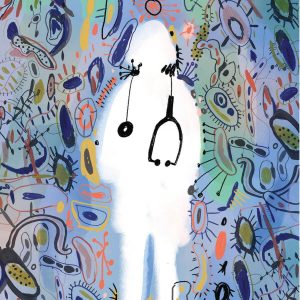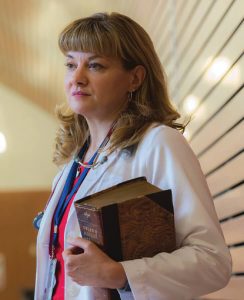
The Covid-19 pandemic has forced the world into a bubble of restrictions, with many fears, many infected and many losses. Unfortunately, it has been like this since the beginning of the year and now, approximately 12 months after the first manifestation of the virus, it seems like there’s light at the end of the tunnel: a vaccine.
There are many laboratories globally, dealing with this issue, all with a common goal. Finally, the good news has arrived – for them, but above all for us, who have survived in this turmoil with so many insecurities and fragilities. Too many people are dying because they’re not able to combat this virus. There are also, those who have not been affected, but since others depend on us, we have to be equally concerned. Public health is, inevitably, public responsibility.
When we hear that a vaccine, which normally takes years to develop and get approved, is being presented to us in a fraction of that time, it’s natural that there will be doubts and uncertainties. To help add some clarity to this situation, we spoke with Dr. Lynora Saxinger, scientist and professor at the Department of Medicine, Division of Infectious Diseases, University of Alberta, Canada. In our conversation, she demystifies some of the myths and clearly speaks to the importance of this immunization campaign.
Milénio Stadium: How did you feel when you saw speed that COVID-19 spread? What did you fear most?
Lynora Saxinger: I remember seeing the news of this illness from China December 31st 2020, and as an infectious disease specialist, being very concerned. When I saw images from Wuhan of a hospital built within a week, I realized this was going to be a big problem. Like many, though, I still thought of it is something happening somewhere else for probably too long- It seems that we knew it could happen here but didn’t in our hearts feel it would. My initial fears as we saw it spread was of excess deaths and societal disruption, the need for distancing from others in a time of great stress, and the strain on the healthcare system – and those things all happened.
MS: Normally, the development of vaccines is something that requires many years but today, with tight schedules imposed by political and media pressure, we have several vaccines awaiting authorization to start being administered. As an investigator, how do you deal with all this?

LS: I think the development of vaccines in under a year is truly an amazing achievement. I think people need to know is that most of the vaccines were already at least partly developed, and tested for other diseases, like other epidemic coronavirus (SARS or MERS viruses) or in the case of mRNA vaccines, for other conditions entirely. The mRNA vaccines are the first ones we have. They are interesting because they deliver a time-limited recipe for your own cells to make a tiny portion of the virus, to teach your immune system how to recognize it and defeat it. The delivery system for mRNA is very important- and the only thing that needs changing is the “recipe“ being delivered.
Therefore, mRNA vaccines that were well along their way could quickly be adapted to deliver this different recipe. So, the science was not starting from nothing, there was a good base.
The next thing is that it ordinarily takes at least a few years to do all of the regulatory paperwork and get funding for trials. Because this disease was spreading a clock cross the globe and killing so many, a lot of funding and support to reduce the slowness of bureaucratic processes was in place.
The last important thing is speed of results. In vaccine studies, they decide in advance how many people need to receive the vaccine or the placebo in advance and then how many infections they need to observe to see if the shot protected people. The last big vaccine study report I recall had 30,000 people in it and took over four years to complete the trial because it took that long to enrol patients and then observe for the outcome which was developing shingles infection or not. It took likely 10 years from the start of the process. Because of the high daily case numbers of COVID-19, these studies came to very high numbers extremely quickly. They didn’t cut corners in terms of the types of studies needed to show safety, the number of people studied, or the scientific development. They reduced time in getting enough COVID cases to observe and reducing bureaucratic processes and getting funds. Questions about whether or not the mRNA vaccines completely prevent people from carrying the virus are important because if it does not prevent carrying the virus after contact, people could still spread it to others. Also, we don’t have long-term safety data. The type of vaccine and the fact that the mRNA remains in the body for a very short time and cannot actually become part of the body is very reassuring that long-term side effects do not seem likely. But we still need to carefully follow along with all who have received it to look for any signals of a problem.
MS: Development speed aside, with the knowledge you have of the work that has been done, do you think we can trust the effectiveness of the vaccines that are now being presented?
LS: The companies have supplied very detailed and complete data from the trials to the regulatory agencies. They are all looking at this with great care and attention because the stakes are very high. Some of these documents have just been made publicly available, and I personally am very impressed with how the trials were designed and carried out. I think the results appear to be very genuinely excellent and I couldn’t be more excited that we will finally have such a useful weapon in our fight against this disease. I think the risk of the disease is far higher than the risk of a problem from these vaccines. They str highly effective (about 95%) in preventing COVID19 disease, especially offering near complete protection against severe disease. That’s very good.
MS: What do you think of the position taken by those who say they will not receive the vaccine, at least, not at an early stage?
I can understand people feeling that the vaccines may seem to have come too fast, but as we just discussed, I think that we can reassure people that these vaccines have met our usual very high standard of safety for vaccines. Thinking about people who are inclined to completely refuse the vaccines, I have to say there is a lot of very silly and wrong information spreading around the vaccines for reasons that are honestly unclear to me. However, the Internet gives a large voice to people with unusual and incorrect beliefs, unfortunately! I think people who just feel cautious likely will be reassured by the close of follow up and reporting data as more people receive the vaccine. In other countries they’ve already started vaccine campaigns, and everyone will be looking closely for any signal that there is a safety problem for any particular group of patients. At the end of the day, I think most people would see the promise of living in a society that is free from the fear of this infection as being worth getting the shot. Truthfulness, open communication, and encouragement would be the first things to do to help people in their decisions around vaccines. If they’re genuinely was a dangerously high number of people who are refusing, I suppose our attention would have to be put on what to do to address their concerns. I’m happy to roll up my sleeve in public to show that I do trust this process and I really think the vaccines will be good.
MS: Do you think any of the advertised vaccines will be able to give lasting immunity?
LS: With respect to the duration of immunity, how long they will protect- it is unknown of course but the work so far is promising to me. These vaccines seem to be capable of creating a very tailored and balanced immune response to a tiny piece of viral protein that is very important in the virus attaching to cells. Although it is possible that booster doses or repeated shots may be needed, there are other diseases where a single shot can give a very long-lasting immunity and I’m hoping this is one of them. I’d still rather have a booster shot if needed than COVID-19!
MS: Both Europe and the USA have already announced that they will begin administering vaccines before the end of the year to those most at risk. What do you think of the current situation in Canada?
LS: The vaccines have come more quickly than I had dared to hope, although the first vaccine that we have is a bit difficult because it needs to be kept at very cold temperatures so there are strong protocols to be able to give it properly, and it can’t really be taken away from centralized sites yet. However, Canada has done very well on the vaccine stage with getting us access to potentially a whole menu of vaccines that will be very useful in the coming months.
MS: In your opinion, what criteria should be adopted in the distribution and administration of the vaccine? Which groups should be considered a priority?
LS: I think we all can agree on the first principles used in vaccine planning, which are that those at highest risk of death and those at high risk of infection by virtue of work in healthcare are to be first. This disease is far more fatal in older people (10 to 25% of elderly people with COVID-19 die), so long-term care and congregate living settings, and elderly people in the community are very important to protect first. Individuals who are essential workers and have medical conditions that might result in extra risk of disease would generally be next. It will be important also to look at the strategies and experience elsewhere as we move along, as the best vaccine rollout should hopefully reduce the community risk of infection even for those who have not yet had the vaccine themselves. In any case, we will still likely be masking and distancing and handwashing over the summer as the vaccine is provided to larger numbers of people.
Although these measures and restrictions are quite tiring, I really think that they’ll be easier to manage on the way out of this then on the way into it, as we will all be looking forward to things becoming much more normal as we rebuild our lives and plan how things can be after COVID-19.
Catarina Balça/MS








Redes Sociais - Comentários